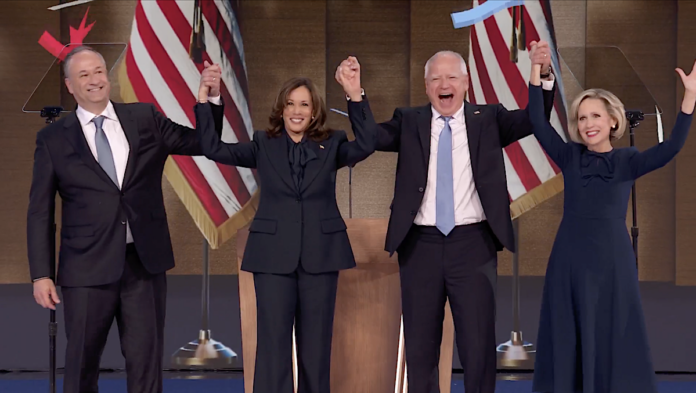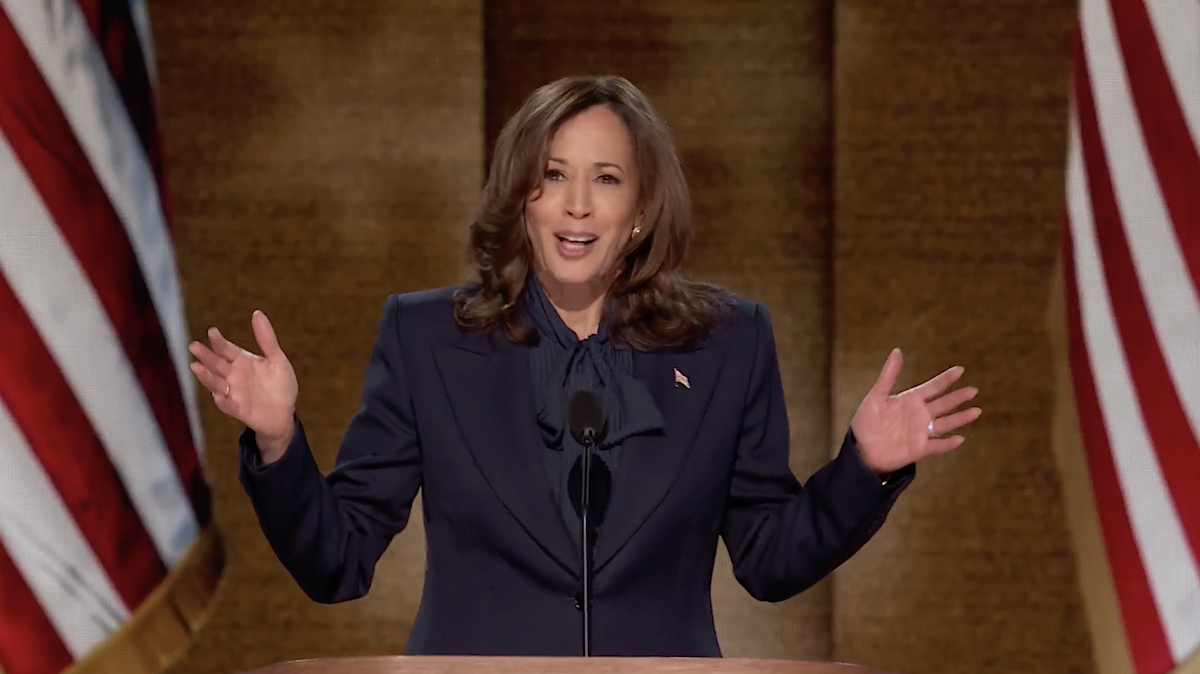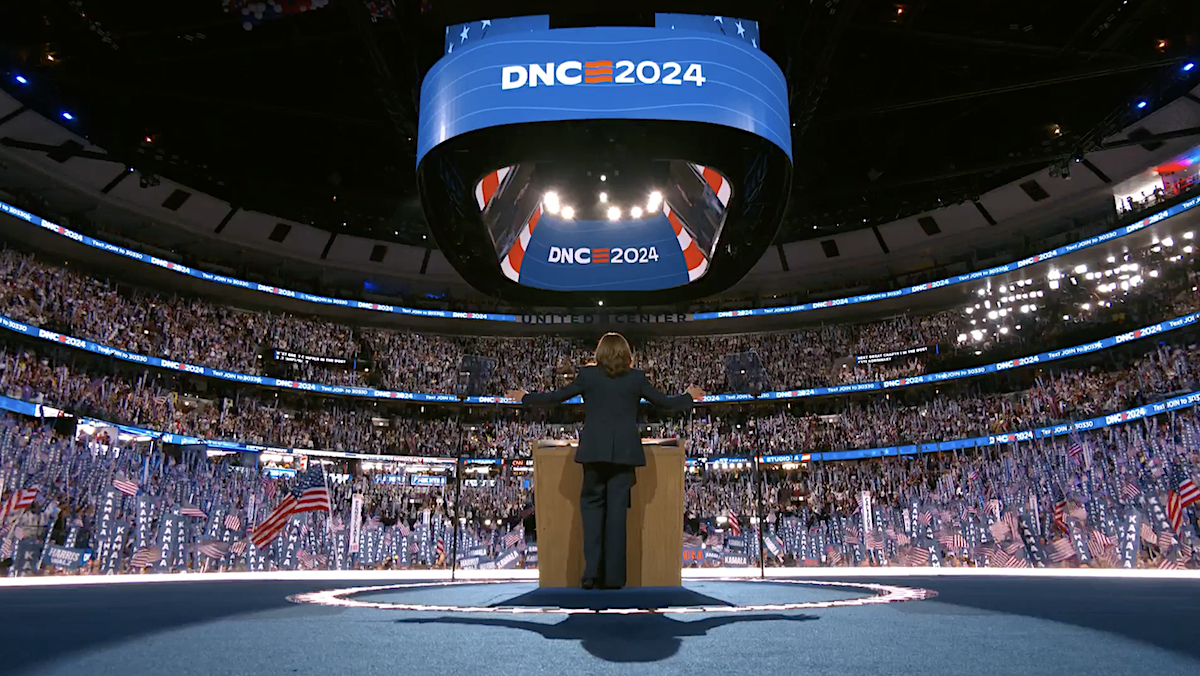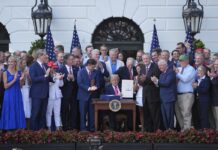
CHICAGO (States Newsroom) — Vice President Kamala Harris accepted her party’s nomination for president Thursday evening, pitching her candidacy as an opportunity for the nation to move forward, rather than accept a dark future she said would follow a second election of her Republican opponent.
Harris on the last night of the Democratic National Convention took advantage of the largest television audience she’s likely to have at least until her first debate with Republican nominee Donald Trump next month.
The vice president told her life story to the millions of Americans watching, saying it informed her agenda meant to boost the country’s’ middle class.
She characterized herself as a lifelong public servant and unifier, in contrast to what she described as Trump’s divisive self-centeredness.
“My entire career, I have only had one client: the people,” she said. “And so, on behalf of the people, on behalf of every American, regardless of party, race, gender, or the language your grandmother speaks, on behalf of my mother and everyone who has ever set out on their own unlikely journey, … on behalf of everyone whose story could only be written in the greatest nation on Earth, I accept your nomination for president of the United States of America.”
She professed her patriotism several times in her roughly 40-minute address. Near the close, she urged the Democrats in the arena and viewers at home to work for her election on behalf of the country.

“Let’s get out there and let’s fight for it,” she said “Let us write the next great chapter in the most extraordinary story ever told.”
Americans across the nation made their assessments. Yvette Young, a lifelong Philadelphia resident and project manager at SEPTA who attended a watch party at a Harris campaign office, said she thought it was an excellent speech and comprehensive.
“She touched on, I think, every issue,” Young said. “She wasn’t afraid to call Donald Trump out on his nonsense and put into perspective how he has harmed our country.”
A middle-class childhood
Harris has downplayed the historic nature of her candidacy — she is the first Black and South Asian woman to lead a major party ticket and would be the first woman president of any race — but expanded Thursday on the values her immigrant mother instilled in her.
Her mother, a scientist from India, “was tough, courageous, a trailblazer in the fight for women’s health,” she said.
Harris described her upbringing as middle class, saying she was raised mainly by her mom after her parents divorced. Harris’ father was a Jamaican student who met her mother at a civil rights meeting, Harris said Thursday.
The vice president promised to be a middle-class champion, creating what she called “an opportunity economy” that would unite labor, small businesses and workers. Additionally, she pledged to “end America’s housing shortage,” to lower the cost of everyday needs.
Ahead of the convention, Harris unveiled policy details to stop price gouging, boost the child tax credit, curb rent hikes and help first-time homebuyers.
“We know a strong middle class has always been critical to America’s success,” she said. “And building that middle class will be a defining goal of my presidency. This is personal to me. The middle class is where I come from.”
Her remarks were applauded by another person at the watch party, Lindsay Davis, a Germantown resident and UX designer.
Davis believes that there’s a particular issue that Harris can talk about that can sway undecided voters.
“A lot of the stuff she’s already said about making it easier for first-time homebuyers to buy a house that was, like, huge,” she said. “I think that’s really big for, like, younger people that aren’t boomers, I guess Gen Z, Gen X, Gen whatever, all the Gens.”
A sense of justice
Harris’s mother also taught her daughters “never to complain about injustice, but to do something about it,” she said, repeating a line former first lady Michelle Obama used throughout a Tuesday speech.
She said the same sense of justice motivated her to become a prosecutor, which she did as the district attorney of San Francisco and attorney general of California before her election to the U.S. Senate in 2016.
As the top lawyer in California, Harris won a $20 billion settlement for homeowners in the state as part of a nationwide lawsuit against banks over predatory lending during the 2008 financial crisis.
North Carolina Gov. Roy Cooper, who was also his state’s attorney general at the time, said Thursday in remarks just before Harris spoke that he saw her demand much more than what the banks initially offered.
“America, we’ve got a lot of big fights ahead of us,” he said. “And we’ve got one hell of a fighter ready to take them on.”
Trump’s ‘dark agenda’
Harris described much of her policy objectives in contrast to her opponent, the former president seeking another term, Trump.
While her administration would work to expand reproductive rights, Trump would further restrict them, she said.
Trump would pursue a nationwide abortion ban “with or without Congress,” limit access to birth control and require women to report miscarriages, she said.
“Why is it that they don’t trust women?” she asked the packed United Center crowd. “Well, we trust women.”
She said if she is elected, and Congress passes a bill restoring the Roe v. Wade abortion decision, she will sign it into law. For that to happen, Democrats would likely need to not only control both chambers, but also have 60 votes in the Senate.
On foreign policy, Harris said Trump wouldn’t stand up to dictators, “because he wants to be an autocrat himself.”
She described November’s election as a “fight for America’s future.”
The crowd broke out in a chant: “We’re not going back.”
She also asked the audience to imagine how dangerous Trump would be in office after a July 1 U.S. Supreme Court ruling that said Trump could not be prosecuted for most actions he took in office.
Second woman candidate
Harris addressed a packed crowd in which many women wore white, a nod to the women’s suffrage movement.
Former Secretary of State Hillary Clinton, who gave a speech Monday, was the first woman to accept the presidential nomination of a major party at the 2016 Democratic National Convention, when she gave her acceptance speech in a white pantsuit.
But Harris dressed head to toe in black.
She took the stage to Beyoncé’s “Freedom,” a song the campaign has made its anthem. Beyoncé, however, did not appear in person, despite widespread rumors she would show up.
After Harris’ speech, what Democratic officials said were 100,000 red, white and blue balloons were released, a convention tradition. Harris and her husband, Doug Emhoff, and her running mate, Minnesota Gov. Tim Walz and his wife, Gwen Walz, held hands onstage and acknowledged the cheers of the delegates.
‘Unexpected’ path to nomination
Harris acknowledged her abbreviated path to the nomination, which began just 32 days ago, was highly unusual.
After President Joe Biden dropped his reelection bid and endorsed Harris on July 21, the party quickly coalesced around the vice president.
She racked up the necessary delegates and after a short vetting period tapped Walz. They soon hit the campaign trail in the seven key battleground states – Arizona, Georgia, Michigan, Nevada, North Carolina, Pennsylvania, Wisconsin.
Throughout the whirlwind, she has praised Biden for his leadership and accomplishments.
She did again in the opening lines of her speech Thursday.
“Your record is extraordinary, as history will show,” she said. “And your character is inspiring.”
Republicans have criticized the process that led to Harris’ nomination, calling it a “coup” against Biden.
In a written statement ahead of Harris’ address Thursday, Republican National Committee Chairman Michael Whatley repeated that claim and slammed Harris’ policy proposals as “the most radical agenda ever put forward at a major party convention.”
“After staging a coup to take the nomination from Joe Biden just weeks ago, Kamala Harris will take the stage at the DNC to share her dangerously liberal agenda with the Democrats gathered to coronate her in Chicago,” he said.
Convention capstone

Harris’ acceptance marked the end of a four-day convention focused on the theme of passing the torch to the next generation that was woven through the speeches of long-established Democrats in the party, such as former President Bill Clinton, who said he loved “seeing all these young leaders.”
On the first night, Biden, who dropped out of the race last month, delivered a farewell address to Democrats, endorsing Harris. The Obamas Tuesday made the case for Harris, saying in her candidacy, “hope is making a comeback.”
As Harris gave her speech aimed at defining her candidacy and vision for the country as one of freedom and joy, a sit-in protest occurred outside the United Center. Dozens of Uncommitted delegates who advocated for a Palestinian American to have a speaking slot at the DNC said they had their request denied by the Harris campaign.
Inside the arena, Harris said negotiating an end to the war, with a return of Israeli hostages and a lasting cease-fire, was a top administration priority.
“President Biden and I are working to end this war, such that Israel is secure, the hostages are released, the suffering in Gaza ends and the Palestinian people can realize their right to dignity,” she said.
At the watch party in Philadelphia, Alina Taylor, a special education teacher who lives in Upper Dublin, said as a Democratic committee person for her area, she plans to volunteer and canvass for the Harris campaign.
“I came down here because I’m fired up and I’m ready to go,” she said.
She said prior to Harris’ speech that she wants to hear her talk about the economy and what she plans on doing about reproductive rights.
“That’s so huge, because I want my daughters to have more rights than me, and I don’t want them to have less,” she said.
Pennsylvania Capital-Star reporter John Cole contributed to this report.






